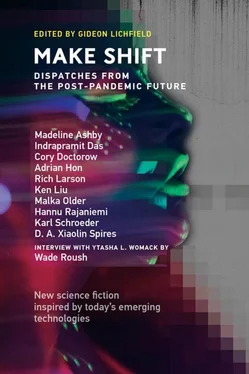Based on posts in the project forum, the most popular (self-reported) reasons for people to contribute to this project are:
• Dislike of the actions or policies of the United States / China / Russia / India / Saudi Arabia / the UK / some other country
• That freedom of movement, including telepresence, is a fundamental human right
• The world is a better place when people can move around and get to know one another and teach one another—telepresence is the best way to do that without polluting and ruining the planet
• The world is a better place when people stay where they are and stop crossing borders and trying to change how other people live—telepresence is the best way to do that without turning everyone into a prisoner or forcing them to starve for lack of economic opportunities
• It’s fun to mess with governments and see politicians’ heads explode
How can I trust the software? By reading the source code. That’s it.
As you can see from the answers to the last question, the self-reported reasons for why volunteers contribute code here are often mutually contradictory, as is the case with all leaderless, distributed movements.
Is it possible that there is code in here from PLA hackers in Beijing? Of course.
Is it possible that the CIA has contributed? Yep.
Is it possible that—Let me just stop you there. Yes, yes, and yes.
Every state thinks there’s a way it can turn Nene Huddle to its own advantage; spies, like everyone else, want to jaunt. Nation-states’ self-interest and mutual suspicion redound to our benefit: no other open-source project has received as much adversarial code review and scrutiny. Out of swords, secure telepresence tunnels.
Still, you can’t trust people’s motivations, only the result. Read the code, verify for yourself that it’s safe to run. You have the freedom, which means you have the responsibility.
Doesn’t your software facilitate crime/enable money laundering/hurt democracy/perpetuate imperialism/etc.? You’re asking the wrong question.
All right, maybe this is worth elaborating a little more.
Is it true that people can use the network to do terrible things? Without a doubt. But that’s true of any technology. (However, every single instance where the United States claimed that our network facilitated terrorism—so far at least—has turned out to be a lie.)
What do you want to do with Nene Huddle?
In a world where borders are increasingly impenetrable, Nene Huddle is often the only way for us to remain together. Those with skills but no markets at home use it to secure for themselves and their loved ones a better life. Students, scholars, and researchers use it to find the collegiality and inspiration that feeds invention and free thought. Journalists use it to tunnel into oppressive countries to get the facts and shoot footage that can’t be obtained any other way. Activists from across the world use it to bot-swarm protests in the United States because American policies have a disproportionate impact on the rest of the world even though most of us don’t get to vote in your elections. Religious leaders who have been forbidden to speak at home can preach abroad through telepresence. Individuals who are not free to date, love, express their own identities at home can live the lives they wish to live remotely through a long-jaunt tether, a literal lifeline.
Every technology that begins in the hope for freedom eventually risks being co-opted by centralized power. Telepresence was originally a way to allow people to move more freely without the costs associated with transporting physical bodies. It has also, over time, turned out to be a great way for those in power to regulate and control the exchange of ideas and peoples.
The only way to oppose centralized power is to become its very opposite: distributed, leaderless, inventive, formless. If you want your freedoms back, don’t count on a wise leader to save you. Join us.
Download. Encrypt. Jaunt.

6
Koronapárty
Rich Larson
IT’S LOCKDOWN AGAIN, SO I’VE GOT THE TRAM MOSTLY TO MYSELF ON THE WAY HOME,grocery bags penned between my feet. The tram’s nice when it’s empty. No nerve-shredding sounds of snuffling or coughing, nobody talking on their phones. I can relax.
I look out the window and see Prague sliding past in the dark. Sometimes I see my reflection, which always looks gaunter and wrinklier in the tram window. I listen to the whalesong groan of the tram following its track, curving with the river. In the old days I sometimes put my head up against the glass to feel the vibration, but of course I don’t touch public surfaces anymore.
The tram is peaceful until Vltavská, when two teenagers get on, chattering in Czech as they scan their phones on the ticket reader. Both of them are wearing those stupid holomasks, and when the big cartoony mouths aren’t fluttering open and shut to match their speech, they project eerie grins. Always make me feel like they know something I don’t.
I glare at them as they surf handbars down the rattling tram and pick a seat two in front of me. Socially distanced, so I can’t even resent them for that. People are good at following bug policy here.
Not like in Paris. In Paris, every time there’s a wave they have to 3D-print these knobbly pads to glue onto every other metro seat, and then have to chase away the people hawking 3D-printed cushions that fit right over them. That was the last trip me and Jan took together, Paris and then Nantes. Lots of laughs.
Anyways. Here, people play by the rules. I remember visiting Prague once before the Big One, and even back then everybody was painfully polite on the tram. Hardly ever talking, always ready to spring up out of their seats when anybody old got on. Happened to me a couple times, and that was when my hair was only halfway gray.
But these two in their glow-up masks are excited, and it makes them loud, and that makes them annoying. The stream of Czech is punctuated by whoops and laughter. I’ve been here a decade, but I catch hardly anything. It’s rare I speak Czech now that Jan’s passed, and I was shit even before the rust set in—I took lessons for his sake, but I’ve got no aptitude for language.
Especially not ones with seven cases, free-for-all word order, and the ř sound, which basically requires turning one’s mouth into an electric drill. If I ever have to differentiate between třicet , which is thirty, and čtyřicet , which is forty, I go straight to showing fingers. Better than scaring people who might think I’m having a stroke.
But then, from behind the taller teen’s grinning mask, I hear a word I can suss out: koronapárty . We all know that prefix, and “party” has invaded an awful lot of lexicons, Czech included. But we’re on lockdown again, which means curfew’s in effect and partying with over ten people is prohibited.
Maybe they’re discussing a nine-person party, or maybe they’re using the term ironically. Kids do love their irony. Or maybe they’re planning a massive, illegal, underground infection vector fest. It’s not really my business.
Until I hear another intelligible word: Dělnická. Which is the name of my fucking street.
I link my hearing imp to my phone, one of the few things I know how to do with it, and crank the volume up. Then, feeling like a bit of a sneak, I thumb my translator app, the one that helps get me through Czech ministry visits. Inside my left ear, the teens’ conversation turns into electronic English.
Читать дальше













